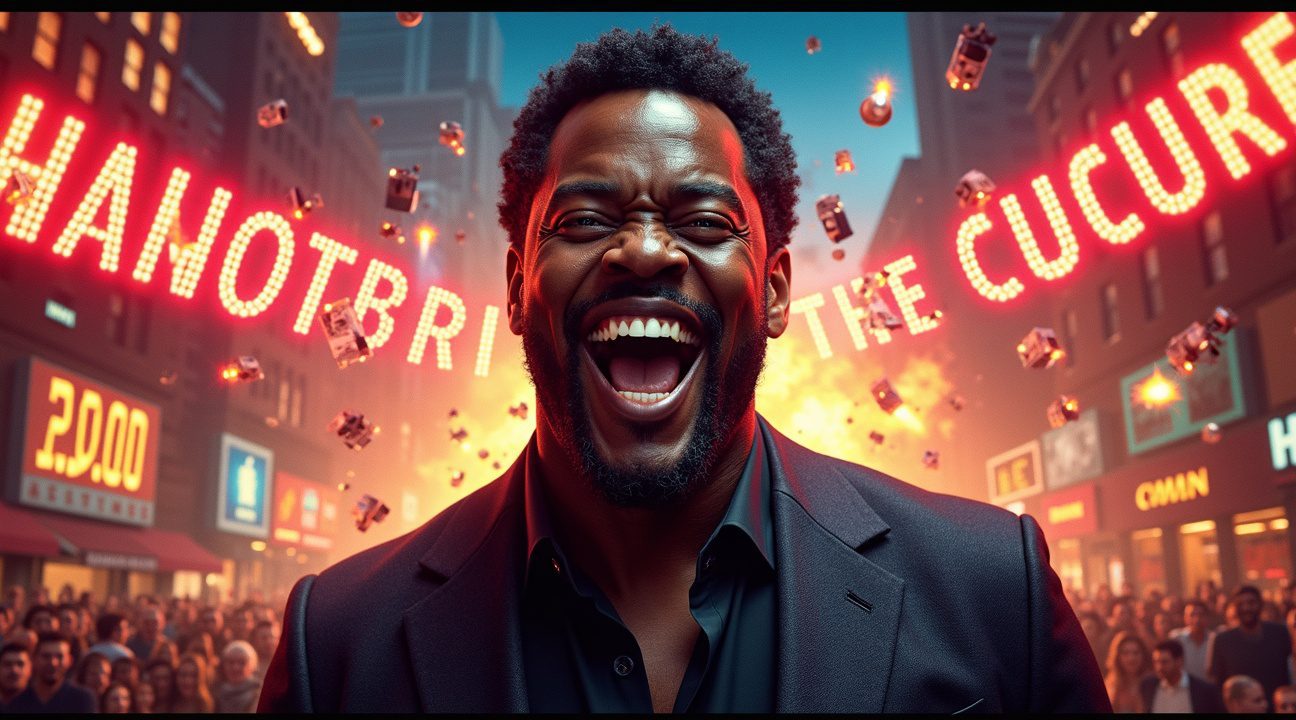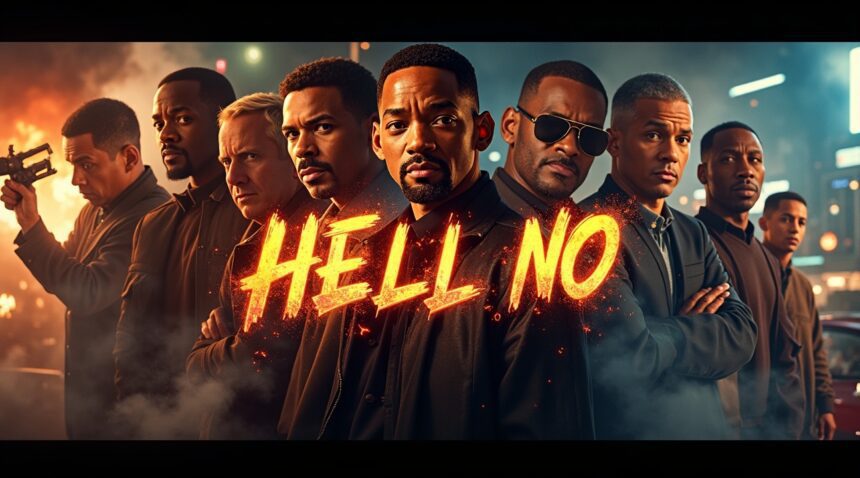Will Smith has strategically deployed his signature catchphrase “Aw, hell no!” across nine different films throughout his career, transforming a simple three-word expression into one of cinema’s most recognizable verbal trademarks.
Key Takeaways
- Will Smith has used “Aw, hell no!” in nine films, including Bad Boys, Independence Day, the Men in Black trilogy, I, Robot, and Suicide Squad.
- The nine films featuring this catchphrase have collectively grossed approximately $7.3 billion USD worldwide, demonstrating its significant commercial impact.
- Smith strategically employs the phrase across different genres and characters, allowing it to feel natural and contextually appropriate with each usage.
- The catchphrase has become a cultural touchstone that sparks social media engagement, inspires memes, and builds audience anticipation—much like Arnold Schwarzenegger’s iconic line, “I’ll be back.”
- This verbal trademark serves as a powerful branding tool that helps create a sense of continuity in Will Smith’s diverse filmography while reinforcing his charismatic and relatable on-screen persona.
You can explore more about Will Smith’s film roles and box office achievements by visiting his IMDb profile.
From Independence Day to Suicide Squad: Nine Films, One Unforgettable Line
Will Smith’s commitment to his signature catchphrase “Aw, hell no!” spans an impressive nine films throughout his career, establishing it as one of cinema’s most recognizable recurring lines. I find it fascinating how this simple three-word expression has become so deeply woven into Smith’s on-screen persona that audiences almost expect to hear it in every action sequence.
The Birth of an Iconic Phrase
The catchphrase made its documented debut in the 1996 blockbuster Independence Day, where Smith’s character Captain Steven Hiller delivered the line with his characteristic charisma. This sci-fi thriller provided the perfect platform for what would become Smith’s trademark verbal reaction to extraordinary circumstances. Independence Day‘s massive success helped cement the phrase in popular culture, setting the stage for its repeated appearances in subsequent films.
Strategic Repetition Across Genres
Smith’s deliberate use of this catchphrase reflects his strategic approach to building a lasting movie legacy. He reportedly aims to create an enduring phrase that rivals other action stars’ memorable lines, much like Arnold Schwarzenegger’s famous “I’ll be back.” The consistency spans multiple genres and decades, appearing in everything from action-packed thrillers to superhero adventures like Suicide Squad.
What makes this repetition particularly effective is how naturally Smith integrates the phrase into different characters and situations. Whether he’s facing alien invasions, robot uprisings, or supervillain threats, the line feels authentic to each moment rather than forced. This authenticity has helped the catchphrase transcend individual films to become part of Smith’s broader entertainment brand.
The phrase has evolved from a simple reaction into a cultural touchstone that fans actively anticipate. Movie audiences often wait for that moment when Smith delivers his signature line, creating a shared experience that connects viewers across different films. This recurring element demonstrates how strategic repetition can enhance an actor’s marketability while providing audiences with familiar comfort in unfamiliar fictional scenarios.
Smith’s approach proves that sometimes the most effective branding comes from consistency rather than constant reinvention. His willingness to repeat this particular phrase shows confidence in its power to resonate with audiences while maintaining his distinctive screen presence across varied roles and storylines.
The Complete Filmography of ‘Aw, Hell No!’
Will Smith’s journey with his signature catchphrase “Aw, Hell No!” began in the mid-1990s and has become a defining element of his cinematic persona. The phrase first emerged in Bad Boys (1995), where Smith’s character Mike Lowrey delivered the line during the film’s high-octane police action sequences, setting a precedent that would follow him throughout his career.
The Sci-Fi and Action Dynasty
Independence Day (1996) marked a pivotal moment for the catchphrase, with Smith’s character Captain Steven Hiller using the line while confronting an alien invasion. This blockbuster established the phrase as more than just dialogue—it became a trademark reaction that audiences began to expect from Smith’s characters.
The Men in Black franchise embraced this linguistic signature across multiple installments. Agent J delivered the memorable line in Men in Black (1997), Men in Black II (2002), and Men in Black III (2012), cementing its place in the series’ comedic DNA. Each appearance felt natural within the context of J’s character development and his reactions to extraordinary circumstances.
I, Robot (2004) continued this pattern when Smith’s character Detective Del Spooner used the phrase while confronting malfunctioning androids. The line perfectly captured his character’s skepticism and alarm at the technological chaos unfolding around him. Years later, Suicide Squad (2016) featured Deadshot delivering the catchphrase, emphasizing the chaotic nature of the anti-hero team’s missions.
The Pattern Behind the Phrase
Fan observations consistently point to nine total appearances of this catchphrase across Smith’s filmography, though official confirmation for every instance remains limited. The recurring use demonstrates Smith’s conscious decision to maintain this verbal signature, creating a subtle thread that connects his diverse roles across different genres and decades.
This pattern reveals Smith’s understanding of audience expectations and his willingness to deliver familiar elements while exploring new characters. The phrase functions as both a comedic device and a genuine expression of surprise or dismay, adapting to each film’s tone while maintaining its essential character.
The strategic placement of “Aw, Hell No!” across various franchises and standalone films showcases how Will Smith’s films include the same catchphrase as a deliberate artistic choice rather than coincidental dialogue. Directors and screenwriters have incorporated this expectation into their scripts, recognizing that audiences associate the phrase with Smith’s on-screen presence.
Each appearance serves a specific narrative purpose while satisfying fan expectations. Whether facing alien invaders, rogue robots, or criminal masterminds, Smith’s characters use this phrase to express their authentic reactions to extraordinary situations. The consistency across different production teams and decades suggests that Smith himself advocates for including this signature line.
The catchphrase has transcended individual films to become part of Smith’s broader cultural impact. It represents his ability to blend humor with action, creating memorable moments that resonate beyond the theater experience. This linguistic trademark demonstrates how actors can establish personal brands within their professional work, creating continuity across diverse projects.
The evolution of the phrase’s usage shows Smith’s maturation as both an actor and a cultural figure. From its early appearances in action comedies to its integration into major blockbusters, the catchphrase has adapted while maintaining its core appeal. This consistency has helped establish Smith as a reliable presence in entertainment, someone who delivers expected elements while still surprising audiences with his performances.
Here’s a brief unordered list of notable films using the catchphrase:
- Bad Boys (1995)
- Independence Day (1996)
- Men in Black (1997)
- Men in Black II (2002)
- I, Robot (2004)
- Men in Black III (2012)
- Suicide Squad (2016)
Though exact records vary, fans continue discovering potential uses of the line across various films and promotional appearances. Some even compile YouTube collections showcasing every time Will Smith utters the legendary catchphrase:
https://www.youtube.com/watch?v=QpDEtskrLOA
The Billion-Dollar Impact of Four Simple Words
Four simple words have helped propel Will Smith to astronomical financial success in Hollywood. Across the nine movies featuring ‘Aw, hell no!’, Smith’s films have collectively grossed approximately £5,959,535,863.31 or around $7.3 billion USD. This staggering figure demonstrates how a consistent verbal signature can become an integral part of an actor’s brand identity.
The phrase has significantly contributed to Smith’s recognizability as a global movie star and often garners frequent attention on social media. Audiences have come to expect and anticipate this particular exclamation, creating a sense of familiarity that transcends individual film plots. Social media platforms regularly feature clips and memes highlighting Smith’s delivery of the line, keeping it alive in popular culture long after each movie’s initial release.
Standing Among Hollywood’s Most Memorable Catchphrases
Fans draw comparisons between Smith’s distinctive line and similarly iconic catchphrases by stars like Sylvester Stallone and Arnold Schwarzenegger. These verbal trademarks serve multiple purposes in an actor’s career:
- They create instant audience connection and recognition
- They establish continuity across different film projects
- They become marketing tools that transcend individual movies
- They help actors maintain relevance in popular culture discussions
Stallone’s “Yo, Adrian!” from the Rocky franchise and Schwarzenegger’s various one-liners have achieved similar status in cinema history. Smith’s “Aw, hell no!” joins this exclusive club of phrases that have become synonymous with their respective stars.
Smith has publicly addressed the importance of the line in his career, including during an interview segment with James Corden. During this appearance, he acknowledged the phrase’s enduring appeal and its role in cementing his cinematic legacy. The actor recognizes that this simple expression has become more than just dialogue – it’s evolved into a cultural touchstone that connects him with audiences worldwide.
The financial impact extends beyond box office receipts. Merchandising opportunities, social media engagement, and brand partnerships all benefit from Smith’s established catchphrase recognition. Studios often capitalize on these verbal signatures in marketing campaigns, knowing that familiar phrases can drive audience interest and create buzz around new releases.
Entertainment industry analysts note that successful catchphrases can add significant value to an actor’s marketability. Smith’s consistent use of “Aw, hell no!” across multiple blockbuster films has created a reliable audience expectation that studios can leverage for promotional purposes. This strategic repetition has proven particularly effective in action and comedy genres where Smith has found his greatest commercial success.
The phrase’s versatility allows it to fit naturally into various dramatic contexts, from high-stakes action sequences to comedic moments. This adaptability has enabled Smith to maintain his signature without forcing unnatural dialogue into scripts. Directors and screenwriters have learned to incorporate the line in ways that feel organic to each story while satisfying audience expectations.
Marketing departments have discovered that featuring Smith’s catchphrase in trailers and promotional materials can generate immediate audience recognition and excitement. The phrase serves as a shorthand for Smith’s screen persona, conveying his characteristic blend of humor, attitude, and relatability that has made him one of Hollywood’s most bankable stars.
The cumulative effect of this verbal consistency has created a powerful brand asset that extends far beyond individual film performances. Smith’s “Aw, hell no!” has become a cultural phenomenon that continues to generate value through various media channels, proving that sometimes the smallest elements of an actor’s toolkit can yield the most significant returns.

Why Smith Keeps Coming Back to His Signature Line
Will Smith embraces memorable and punchy dialogue, a trait that became evident during his early television days on The Fresh Prince of Bel-Air. Among all his iconic lines, “Aw, hell no!” has emerged as his most repeated cinematic phrase, appearing consistently throughout his filmography and becoming an integral part of his star identity.
Smith’s strategic use of this particular phrase across multiple genres demonstrates his understanding of brand consistency in Hollywood. Whether he’s battling aliens in science fiction blockbusters, engaging in high-octane action sequences, or delivering comedic moments, the expression seamlessly fits into diverse narratives. This versatility allows him to maintain a recognizable voice while adapting to different character types and storylines.
Building a Relatable Screen Persona
The phrase serves as more than just a catchy one-liner; it functions as a cornerstone of Smith’s quick-witted and relatable screen persona. His delivery of “Aw, hell no!” typically occurs during moments of disbelief, frustration, or comedic timing, creating an immediate connection with audiences who recognize the authenticity of such reactions. This relatability factor has contributed significantly to his appeal across different demographic groups and international markets.
Smith’s deliberate incorporation of this catchphrase represents a calculated effort to leave a lasting mark on popular culture. The expression has transcended individual films to become synonymous with his brand, much like Arnold Schwarzenegger’s “I’ll be back” or Jack Nicholson’s distinctive laugh. This type of signature element helps actors establish memorable identities that extend beyond specific roles or genres.
The phrase plays a crucial role in establishing the brand identity that Smith cultivates as a movie star. In an industry where actors compete for audience attention and box office success, having a recognizable verbal trademark provides a competitive advantage. Fans attend Smith’s films with certain expectations about his character’s personality and dialogue style, and the catchphrase helps fulfill those expectations while maintaining consistency across his body of work.
Smith’s repeated use of “Aw, hell no!” also reflects his background in comedy and improvisation. The phrase feels natural and unforced when he delivers it, suggesting that it aligns with his genuine personality and communication style. This authenticity contributes to its effectiveness and explains why audiences respond positively when they hear it in different contexts.
The strategic deployment of this catchphrase has helped define Smith’s legacy in modern entertainment. While many actors struggle to create memorable moments that resonate with audiences years after a film’s release, Smith has successfully embedded this expression into the collective consciousness of moviegoers. Nine of Will Smith’s films include the same catchphrase, demonstrating the remarkable consistency of this branding strategy.
The phrase’s effectiveness extends beyond individual viewing experiences to social media and everyday conversation. Fans frequently quote the line, share memes featuring it, and reference it in discussions about Smith’s career. This organic spread through popular culture amplifies the phrase’s impact and reinforces Smith’s position as a leading figure in contemporary entertainment.
Smith’s commitment to including this catchphrase across various projects shows his understanding of audience expectations and brand management. Rather than viewing it as repetitive or limiting, he’s embraced it as a valuable asset that strengthens his connection with fans while providing a reliable element that producers and directors can incorporate into scripts. This approach has solidified his role as both a bankable star and a cultural icon whose influence extends far beyond the silver screen.
Sources:
LADbible – Will Smith used the same catchphrase in nine movies.
LADbible – Will Smith addressed his catchphrase that he’s put in nine films during an interview with James Corden.
AMC – Six of Will Smith’s Most Memorable Movie One-Liners and Quotes.
IMDb – Will Smith Quotes.


